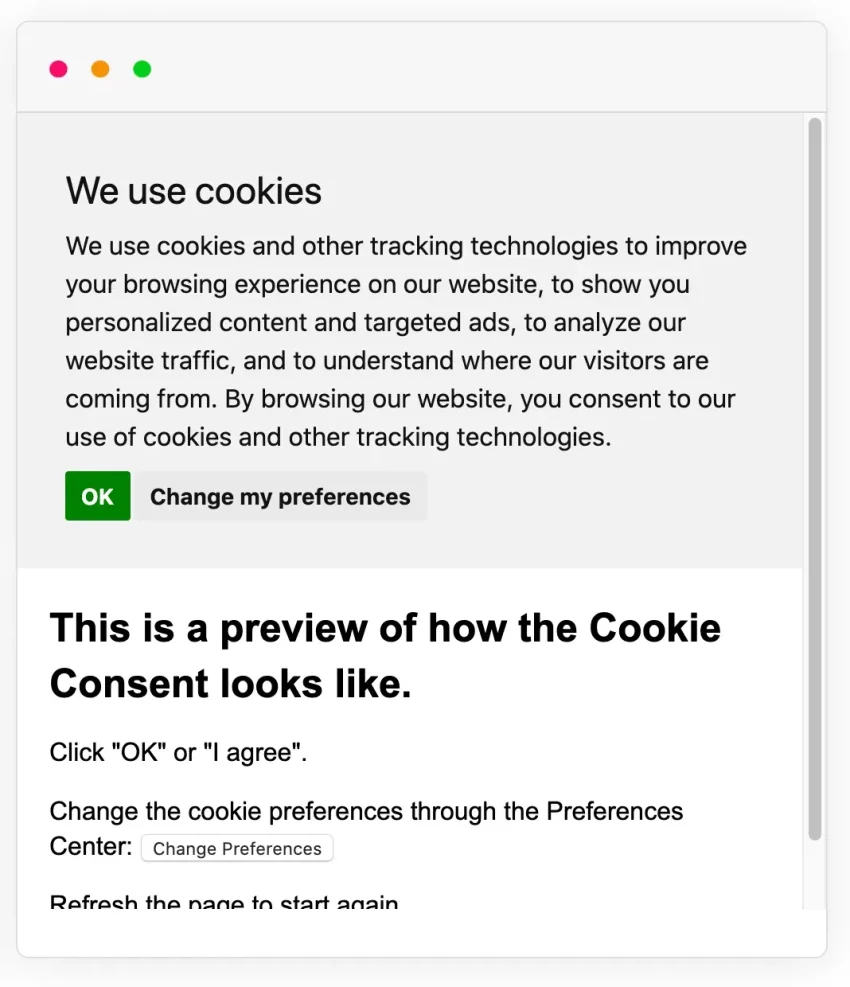Cookie Consent: Essential Guide for Website Compliance
Cookie consent is a crucial aspect of modern website management, ensuring that users are informed about how their data is collected and used. With the rise of digital privacy regulations, such as the European cookie directive and GDPR cookie compliance, websites must actively seek consent for the use of non-essential cookies. This consent not only fosters trust between the site owner and visitors but also aligns with legal requirements surrounding cookies and privacy. Websites that strategically implement a cookie consent policy can enhance user experience while adhering to these regulations. By effectively managing website cookies, businesses can maintain compliance and optimize their online presence.
The practice of seeking permission to use cookies is integral to responsible digital marketing. Often referred to as user consent for data collection, this process allows individuals to control the information shared while browsing online. As awareness of privacy issues grows, ensuring compliance with data protection laws, like the GDPR, has never been more critical. Consequently, many websites now feature detailed cookie management systems that explain the types of cookies in use and their purposes, thereby clarifying how user data will be utilized. Navigating the complexities of online privacy not only enhances user trust but also aligns with the legal landscape surrounding digital data.
Understanding the Importance of Cookie Consent
Cookie consent is an essential aspect of modern web practices, especially in regions influenced by regulations like the European Cookie Directive and the General Data Protection Regulation (GDPR). These laws mandate that websites obtain explicit permission from users before installing non-essential cookies, which track and collect data. By clearly communicating how cookies will be used, websites not only ensure compliance but also foster trust among their users. This transparent approach empowers visitors, allowing them to make informed decisions regarding their privacy and digital footprint.
Moreover, the significance of cookie consent goes beyond legal requirements; it reflects the website’s commitment to user privacy. Implementing a robust cookie consent policy demonstrates to visitors that their data is valued and protected. Users are more likely to engage with a site that respects their preferences, which can lead to higher customer satisfaction and increased loyalty. For effective cookie management, websites must not only inform users about the types of cookies in use but also offer a straightforward way to manage their consent preferences.
Cookie Types and Their Implications for Privacy
Understanding the different types of cookies used by websites is crucial for comprehending their implications on privacy. There are primarily three categories of cookies: necessary, preference, and marketing. Necessary cookies are essential for basic website functionality, such as authentication and security. These are the only cookies that can be stored on your device without your explicit consent, as they ensure that the website operates properly.
On the other hand, preference cookies enable websites to remember user choices, such as language and location, enhancing user experience but requiring consent due to their non-essential nature. Marketing cookies track user behavior across different websites to deliver targeted advertisements. As such, they raise significant privacy concerns, underscoring the need for a comprehensive cookie consent policy. Users should have the option to accept or reject these cookies, making it easier to manage their privacy while navigating online.
Implementing GDPR Cookie Compliance
Adhering to GDPR cookie compliance is crucial for any website operating in or targeting users within Europe. The GDPR sets stringent guidelines regarding data protection and user consent, requiring websites to inform users about the types of cookies used and their specific purposes. Failure to comply with these regulations can result in hefty fines, highlighting the importance of establishing clear cookie consent practices.
To achieve GDPR compliance, websites must utilize cookie banners that provide users with straightforward choices. This includes accepting all cookies, rejecting non-essential cookies, or customizing preferences. Websites should ensure that their cookie consent management systems are user-friendly and informative, allowing users to revoke consent easily at any time. This proactive approach not only meets legal obligations but also enhances user trust and satisfaction.
Best Practices for Website Cookie Management
Effective website cookie management involves implementing best practices that prioritize user experience while ensuring compliance with privacy regulations. A critical practice is conducting a thorough audit of all cookies used on the website—this includes identifying necessary cookies, preference cookies, and marketing cookies. By categorizing and documenting cookie usage, websites can better communicate with users regarding their data practices.
In addition, providing clear and concise information about cookies in the cookie consent banner is essential. The banner should explain what each cookie does and why it’s beneficial to the user, fostering transparency and understanding. Furthermore, allowing users to customize their cookie preferences can significantly enhance user engagement and confidence in the website, ultimately leading to a more positive visitor experience.
The Role of Cookies in Personalizing User Experience
Cookies play a fundamental role in personalizing user experience on websites, making interactions more relevant and seamless. By tracking user behavior and preferences, websites can customize content, suggest products, and enhance overall usability. For instance, if a visitor frequently revisits a site and has shown interest in specific categories, cookies allow the site to present tailored recommendations that align with the user’s previous interactions.
This level of personalization not only improves the user experience but also drives higher conversion rates, as users are more likely to engage with content that resonates with their preferences. However, to achieve this personalization ethically and legally, websites must ensure that they obtain explicit cookie consent from users, especially in light of growing privacy concerns around data collection and usage.
Consumer Awareness of Cookies and Privacy
Increasing consumer awareness of cookies and privacy issues is crucial in today’s digital landscape. Many users are still unaware of what cookies are and how they impact their online experience. Educating the public about cookie usage, particularly regarding tracking and targeted advertising, is essential for fostering informed consent and responsible digital behavior. Websites have the responsibility to clarify this information, helping users understand the purpose of cookies and the need for consent under various data protection regulations.
Furthermore, as privacy concerns continue to rise, consumers are becoming more protective of their data. They expect transparency and control over how their information is collected and used. This trend emphasizes the necessity for websites to adopt comprehensive cookie consent strategies that align with user expectations, making clear what data is collected and how it will be utilized. By promoting awareness and education, websites can build a stronger connection with their users and ensure a more compliant online environment.
Leveraging Technology for Cookie Consent Management
Leveraging technology for cookie consent management is becoming increasingly vital as data privacy regulations evolve. Advanced consent management platforms can streamline the cookie consent process, enabling websites to efficiently categorize and manage cookie usage. These technologies can automatically update cookie policies in response to changing regulations, ensuring ongoing compliance without manual intervention.
Additionally, utilizing tools to monitor user interactions with cookie banners can provide valuable insights into user behavior and preferences. This data can help website operators refine their consent strategies, improving personalization while ensuring compliance with cookie regulations like GDPR. By adopting technology for cookie management, websites can enhance operational efficiency and create a better user experience that respects individual privacy.
The Impact of Cookies on Digital Marketing Strategies
Cookies significantly influence digital marketing strategies, providing marketers with critical data to optimize campaigns and target audiences more effectively. By tracking user interactions across various platforms, marketers can gain insights into consumer behavior, preferences, and engagement patterns. This data allows for tailored marketing strategies that resonate more deeply with target audiences, resulting in higher conversion rates and improved ROI.
However, with recent changes in privacy regulations and growing concerns around data ethics, marketers must navigate a fine line between effective targeting and respecting user privacy. This makes transparent communication about cookie usage and obtaining explicit consent even more crucial. Adapting digital marketing strategies to align with cookie policies while still achieving campaign objectives is essential in today’s privacy-conscious landscape.
Future Trends in Cookie Management and Privacy Regulations
The future of cookie management and privacy regulations is evolving, driven by increasing consumer demand for privacy and enhanced protection of personal data. As legislation such as GDPR and the ePrivacy Regulation sets new standards for data collection and consent, websites must adapt to meet these requirements. This evolution is likely to lead to more stringent enforcement of privacy regulations and an enhanced focus on user-centered designs that prioritize security and data protection.
In response to these trends, businesses may also explore innovative approaches to cookie alternatives, such as server-side tracking and privacy-focused analytics tools. Moreover, strategies for obtaining consent might evolve, moving towards granular consent options that give users more control over their data. By staying ahead of these trends, businesses can not only comply with regulations but also build stronger, trust-filled relationships with their users.
Frequently Asked Questions
What is cookie consent and why is it important for GDPR compliance?
Cookie consent refers to the user’s permission for a website to store cookies on their device. It is essential for GDPR compliance as the European General Data Protection Regulation mandates that websites must obtain explicit consent from users before placing non-essential cookies. This ensures users are aware of how their personal data is being collected and used.
How does the European cookie directive affect website cookie management?
The European cookie directive requires websites to inform users about cookies and obtain their consent prior to storing cookies. This means websites must implement cookie management systems that clearly communicate cookie usage and allow users to opt-in or opt-out of non-essential cookies, enhancing transparency and user control.
What should a cookie consent policy include to be effective?
An effective cookie consent policy should include information about the types of cookies used, their purposes, data retention periods, and user rights regarding consent withdrawal. It should also provide clear instructions on how users can manage cookie preferences and understand the implications of their choices on their privacy and website experience.
What are the consequences of not having a cookie consent banner?
Failing to implement a cookie consent banner can lead to non-compliance with GDPR and the European cookie directive, potentially resulting in legal penalties, fines, and damage to the company’s reputation. It also risks losing user trust as visitors expect transparency regarding their data collection and privacy.
Can users change their cookie consent preferences after making an initial choice?
Yes, users can change their cookie consent preferences at any time. Most websites, compliant with cookie regulations, provide a consent management tool, typically located in the website’s footer, allowing users to modify or withdraw their consent for non-essential cookies.
How do cookies influence user privacy and online advertising?
Cookies directly influence user privacy by tracking online behavior and preferences, enabling personalized advertising. While this can enhance user experience through tailored content, it also raises privacy concerns, as users may not be fully aware of the extent of data tracking and sharing with third parties.
What are the differences between necessary and non-necessary cookies in cookie consent?
Necessary cookies are essential for basic website functionality, ensuring tasks such as security and navigation. Non-necessary cookies, such as those used for advertising and analytics, require user consent. Users must be informed about these distinctions in cookie consent notices to make informed choices about their data.
How can I ensure my website is compliant with cookie consent regulations?
To ensure compliance with cookie consent regulations, implement a clear cookie consent banner that requests users’ permissions before using non-essential cookies. Provide detailed information in your cookie policy about what cookies are used and how data will be processed, making it easy for users to modify their consent preferences.
What role do third-party cookies play in cookie consent policies?
Third-party cookies, placed by external services that track users across different websites, require explicit consent under GDPR and the European cookie directive. Cookie consent policies must inform users of these cookies and provide options to accept or reject them, enhancing user control over their online privacy.
| Aspect | Details |
|---|---|
| Cookies Usage | This website uses both necessary and non-necessary cookies to enhance the user experience. |
| Types of Cookies | Necessary, Preferences, Statistics, Marketing cookies to operate and improve the site. |
| User Consent | Consent is required for non-essential cookies; users can withdraw consent anytime. |
| Cookie Management | Users can manage their preferences via a slider at the website’s bottom left. |
| Analytics | Cookies collect data for website usage analysis and improve marketing efforts. |
| Third-party Sharing | Information about user behavior may be shared with advertising and analytics partners. |
Summary
Cookie consent is crucial for enhancing user experience on this website. It allows users to understand how cookies are utilized, specifically emphasizing the importance of necessary cookies for the website’s functionality. The site utilizes both necessary and non-necessary cookies that help improve functionalities, personalize content, and analyze user behavior. By managing cookie preferences through a visible consent tool, users embrace greater control over their data, which contributes to a more tailored browsing experience.
#CookieConsent #WebsiteCompliance #PrivacyPolicy #UserData #LegalRequirements








